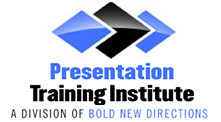There are many components to a great presentation but being factual is definitely at the top of the list. It is imperative that a speaker check their facts prior to giving their presentation to strengthen their professional credibility. Great slides and excellent presentation skills can be ruined if the speaker is giving misinformation. Rather, it is crucial that a speaker takes the time to fact check their information in order present a well prepared, accurate presentation. Here are a few things speakers should avoid if they want to get their message across in a way that is credible.
Never Say “I think…â€
Your views are important and you are certainly entitled to your opinion, but when you are giving a presentation it is always better to stick to the facts. There are simple ways to rephrase your opinion that are more powerful than starting a sentence with the words “I think.â€Â For example, you could say something like “My experience suggests†or “from what I’ve observed.â€Â These simple rephrases turn your views and opinions into something more concrete.
Never Say “I don’t knowâ€
It has happened to all of us at some point. You are in the middle of giving a presentation and someone asks you a question you don’t have the answer to. Of course you should never give a fact that you are unsure of, but you also risk your credibility when you answer with “I don’t know.â€Â Instead, if you are asked for specific data or information that you do not have, simply respond by saying “I can get that information to you after this meeting.â€Â  If you are asked a question that you need more time to think about, it would be fair to say, “I’d like a little more time to think about that and I will email you after the meeting.â€Â Instead of demonstrating a lack of knowledge and facts, these answers still provide a confident response.
Not Giving Credit
If you decide to include specific facts or figures in your presentation, you should always remember to cite your sources. In addition to avoiding plagiarism, finding the sources is a great way to fact check the information you are planning to present. This also includes giving credit to anyone else who may have contributed to the information you are presenting such as team members or colleagues.
Never Share Something That Isn’t Accurate
While it may sound obvious, the pressure of giving a big presentation can cause speakers to answer questions with a guess or make a few tiny assumptions here or there. The bottom line is this: if you aren’t certain about the validity of a point, don’t share it. The consequences to these seemingly tiny guesses can be massive. This is just another reason why it is so important to fact check your information and review your materials. An old data point or outdated statistic can definitely have negative repercussions.
